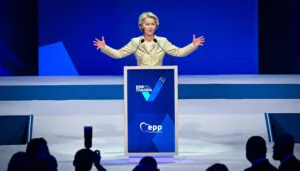Brussels – One of the most serious tensions within the cabinet led by Ursula von der Leyen shows no sign of abating, just months before the end of the current EU Commission’s term in office and during the campaign for the June European elections. ‘Piepergate’ — the political case that erupted following the appointment of MEP Markus Pieper as EU envoy for small and medium-sized enterprises (SMEs) — is widening because of President von der Leyen‘s lack of transparency in the process of choosing her party colleague from the Christian Democratic Union of Germany (CDU). Half the College of Commissioners is now reportedly up in arms over the possible violation of the collegiality rule.

As journalists David Carretta and Christian Spillmann report in the newsletter The Morning Post, Budget Commissioner Johannes Hahn – also from the European People’s Party family like von der Leyen and Pieper – responded to the March 27 letter of colleagues Thierry Breton (responsible for the Internal Market), Paolo Gentiloni (Economy), Nicolas Schmit (Labor and Social Rights, as well as Spitzenkandidat of the European Socialist Party) and Josep Borrell (Vice President of the Commission and EU High Representative for Foreign Affairs and Security Policy), on behalf of the chair of the Union’s executive. “The decision is fully in line with the rules,” Hahn argues in his response, from which it also emerges that Pieper signed the contract on March 31 (Easter Day) “and is expected to take up his duties on April 16.”
A closed door to the request to discuss again the steps of the appointment process within the College of Commissioners, without even a word from President von der Leyen. But the same four commissioners came back to the fray yesterday (April 8) with a new letter addressed again to the number one of the EU executive, viewed by the two Brussels-based journalists: “We believe that a broader discussion on the transparency and collegiality of the appointment process to senior positions within the Commission is needed.” Meanwhile, also building up is the case on the nomination of the chief of staff, Björn Seibert, and the newly appointed director for ‘Communication and Policy Services’ at the Directorate General for Communication (Dg Comm), Alexander Winterstein, respectively, campaign manager and head of communication and media relations for von der Leyen as top candidate of the EPP, the four European commissioners pointed the finger at the fact that the appointment did not take into account the rule of collegiality, which requires the participation of all commissioners in the selection process.

European Commission President and Spitzenkandidatin of the European People’s, Ursula von der Leyen (credits: Daniel Mihailescu / Afp)
‘Pipergate’ is allegedly only the latest case -and the most egregious – of von der Leyen’s way of handling high-level appointments. So much so that half of the College of Commissioners are allegedly particularly angered by President von der Leyen’s behavior and her cabinet’s lack of transparency. In addition to the four commissioners who signed the two letters, The Morning Post reports that seven other members of the EU executive are dissatisfied with what has gone on since January 31 to the present: Margrethe Vestager (Executive Vice-President and Commissioner for Competition), Věra Jourová (Vice-President for Values and Transparency), Didier Reynders (responsible for Justice), Elisa Ferreira (for Cohesion and Reforms), Kadri Simson(for Energy), Janez Lenarčič (for Crisis Management), and Helena Dalli (for Equality). If confirmed by a majority of the political groups in the European Parliament, a vote at the mini-plenary session on ‘Piepergate’ is scheduled for Thursday (April 11) on the initiative of the Greens/Ale Group to call for the revocation of the MEP’s appointment from the CDU.
The ‘Pipergate’ case.
It all started on January 31, when the European Commission announced the appointment of Pieper as EU envoy for SMEs – to keep a “close relationship” with national business representatives – taking office at a “subsequent” date and reporting directly to President von der Leyen and Commissioner Breton. According to the Commission, Pieper would have “extensive experience and expertise in SME policies” as a member of the European Parliament’s Committee on Industry, Research and Energy (ITRE) in this legislature (he has been an MEP since 2004) and has reportedly demonstrated “a commendable track record” in strategic relations “with a diverse range of stakeholders, demonstrating strong leadership, advocacy, and negotiating skills.”

Internal Market Commissioner Thierry Breton
However, the first doubts about the choice of Christian Democrat Pieper were raised on Feb. 29 by 12 MEPs from the Green/ALE, S&D, Renew Europe, and The Left groups, who, in a written question, committed the Commission to answer about the “additional qualifications” that allowed Pieper to outperform other candidates in the selection process. In particular, MEPs revived reports that “other female candidates from under-represented member states in positions of responsibility scored better in the three-step recruitment process.” It is why they raised “questions about the transparency of the process and the influence of the Commission President.” It is no coincidence that one of the questions posed to the College of Commissioners is precisely how much “the party affiliation of the successful candidate played a decisive role in his appointment.” Czech MEP Martina Dlabajová (Renew Europe), a candidate for the post, has already filed an appeal with the Commission’s Directorate-General for Human Resources.
While the first signer of the question, German Green Daniel Freund, said that “after five weeks” since the request, “I have still not received an answer” from the EU Commission. The first letter from the four Commissioners explicitly asked von der Leyen to discuss “at the earliest possible opportunity” within the College about “these allegations and the possible impact on the next steps in the hiring process” of Pieper. In addition to party affiliations (Gentiloni, Schmit, and Borrell are Social Democrats, while Breton is a liberal), the action of the four commissioners was allegedly determined by the fact that President von der Leyen bypassed the recommendation in favor of Dlabajová by Breton, the commissioner responsible for judging the most suitable candidate.
English version by the Translation Service of Withub








